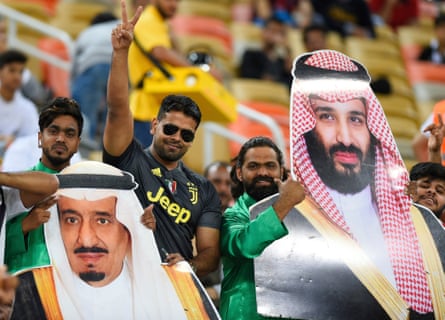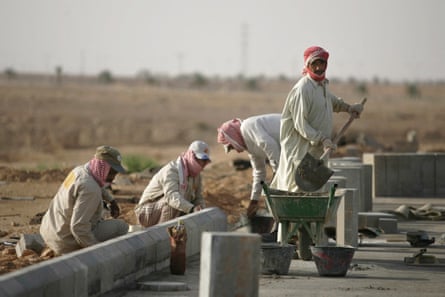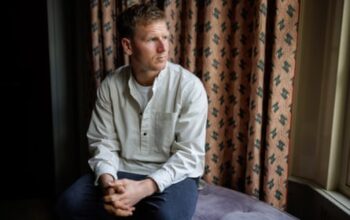S
In 2034, the World Cup will take place in Saudi Arabia. This information is already known, even though the bidding process by Fifa won’t be completed until 2024. However, with a decade to go until the tournament, there is still a lot that is unknown. While some concerns, like the schedule of games, hold great importance, there are other areas that are even more significant. Considering the significant influence of the global football community, there are three main uncertainties that need to be addressed.
Human rights
The biggest obstacle for FIFA when bringing the World Cup to Saudi Arabia is figuring out how to uphold their promise of respecting human rights. This is due to the fact that the host country has a history of regularly violating these rights. In 2016, FIFA, under the leadership of new president Gianni Infantino, made the decision to follow the United Nations’ principles on business and human rights in all of their operations. This commitment, as stated in FIFA’s laws, requires them to acknowledge and strive towards safeguarding all globally recognized human rights.
Unfortunately, the country known as the Kingdom of Saudi Arabia (KSA) disregards several articles outlined in the Universal Declaration of Human Rights. While there have been efforts to enhance their human rights standards, Saudi Arabia currently ranks a low eight out of 100 in the highly regarded Freedom in the World report, conducted by Freedom House. This report evaluates the civil liberties and political rights in different nations. In Saudi Arabia, speaking out against the government can result in a death sentence, and women are legally obligated to comply with their husbands in a “reasonable manner.” Additionally, homosexual acts are considered illegal.
Many doubt if Fifa will follow through with their promises regarding human rights, even if they are only focused on projects linked to the World Cup. However, there is an opportunity for possible action. The Saudi 2034 bid is required to submit an objective evaluation of human rights in their country to Fifa by this summer as a part of their bid. According to the selection process, Fifa must evaluate the risks regarding human rights, with “sustainability and human rights” being one of six key criteria.

A consultancy or a group of academics could conduct the independent assessment, but there will be no direct involvement from human rights organizations due to their inability to operate in Saudi Arabia. According to Lina al-Hathloul from the organization ALQST, which promotes human rights in the country, allowing human rights organizations to enter Saudi Arabia is crucial in ensuring that Fifa fulfills its commitments. Al-Hathloul, a Saudi national living in exile, stresses the importance of pushing for the country to permit human rights organizations to monitor the situation. This, she believes, will lead to more transparency once independent monitoring is established.
Hathloul suggests that one crucial step would be for the global community to openly address the situation in Saudi Arabia. She remains hopeful that sports can serve as a means of connection and progress for a country, but notes that many choose to remain silent on the issues in Saudi Arabia, citing it as a cultural matter and accepting the statements of the Saudi government. This only serves to mask the true state of affairs while actively participating in the cover-up.
“However, those in positions of authority continue to hold a fear of the populace. Despite not having explicit or formal control, the people still possess power and influence. This is evident in their actions of concealing information surrounding trials and prison conditions, demonstrating a concern for their public image. The government seeks to present a facade of openness and freedom to the international community. The citizens must utilize their leverage to illustrate to Saudi Arabia that they are aware of the lack of transparency. They must engage in a strategic battle of narratives, proclaiming, ‘Even though Saudi Arabia goes to great lengths to conceal the truth, we will not allow them to escape accountability.'”
Labour rights
The protection of workers is crucial in terms of mega sporting events, especially the World Cup. While labor rights are inherently human rights, the spotlight is on ensuring the safety and well-being of workers, especially in light of the tragic loss of over 6,500 migrant workers in Qatar after the country won the bid to host the 2022 World Cup. This tragedy should serve as a wake-up call to prevent any similar occurrences in Saudi Arabia.
Fifa has made a commitment to protecting workers’ rights and ensuring their safety in accordance with human rights standards. An ongoing inquiry is investigating whether or not it has fulfilled this commitment in Qatar. However, in Saudi Arabia, new challenges have arisen. According to Mustafa Qadri of Equidem, a human rights and labor organization, the situation in the country is complex and it is leading in some areas of worker protection compared to other Gulf states.

Display the image in full-screen mode.
According to Qadri, Saudi Arabia has the most significant political influence in the Gulf region and also has the worst working conditions compared to other Gulf states. This creates a dangerous situation for FIFA to hold a tournament in a country that does not prioritize human rights.
The officials in Saudi Arabia have reported advancements in labour rights, such as the elimination of the kafala system where migrant workers are tied to their employers, as well as efforts to control recruitment. While Qadri suggests that there are additional changes that could be implemented, some of these changes resemble the ones that were only recently implemented in Qatar as the World Cup neared.
“Enabling employees to become members of valid independent labor unions would be a significant step,” he states. “Granting employees the ability to file grievances without fear of legal repercussions. Abolishing the absconding law to eliminate the criminalization of workers who flee. Ensuring that both female and male workers are equally safeguarded.”
Reworded: Qadri is skeptical about the success of bringing about significant change. He explains, “Due to the low standard set, any miniscule improvement will be seen as a positive by Fifa, similar to what happened in Qatar.” He adds, “Although there have been some improvements in Qatar, considering the large amount of funds, publicity, and skills invested in the country, it can still be considered a major disappointment.”
Infrastructure
The construction of stadiums, facilities, transportation, and lodging necessary for the World Cup to occur is an additional concern, separate from the main issues. Saudi Arabia can look to the logistical achievements of Qatar as a model for their own preparations, as they are not starting from scratch. However, it should be noted that they were only able to bid for the 2034 World Cup because Fifa decreased the number of existing stadiums required in a bid from seven to four.
Although the bidding process is still ongoing, Saudi Arabia has not revealed any specific plans for the tournament publicly. It is customary for the country to not downplay its ambitions, and the pace and scope of its construction projects are impressive.
On a later date in January, the inaugural game took place at the Kingdom Arena, the recently constructed residence of Al-Hilal. The building process only took 180 days. Populous, the architectural firm, revealed the initial designs for Prince Mohammed bin Salman Stadium in Qiddiya. The stadium is named after the sovereign crown prince and is specifically designed to meet the standards of the Fifa World Cup. The 45,000-seat stadium will be adorned with a massive LED screen and situated on the brink of a cliff.
Qiddiya is part of a group of 16 major projects, called “giga-projects,” that are currently being developed as part of Bin Salman’s Vision 2030 plan. Another one of these projects, called Neom, is expected to have at least one stadium for the World Cup. However, both Neom and Qiddiya have yet to be built. Along with these projects and the World Cup, Saudi Arabia has also committed to creating the necessary infrastructure to host the 2029 Asian Winter Games and the World Expo in 2030. This is a challenging undertaking, even for a country with a sovereign wealth fund of over $600 billion.

Ed James, from Meed, a consultancy for business intelligence, states that in Saudi Arabia, there is a concern about the capability to carry out multiple projects simultaneously. He acknowledges that there is a lack of resources in the country to achieve this.
“We have spoken about it openly. When it comes to the necessary materials such as concrete, glass, steel, and equipment like diggers and mobile cranes, there is currently a shortage. This means we will not have enough supplies to complete all of these projects simultaneously. As a result, there will be added expenses.”
According to James, the Saudi government is using a strategy of promoting multiple industries to establish operations in the country as a way to bypass resource challenges. He mentions industries such as glass, steel, electric vehicles, and cables, and states that the government is offering assistance in setting up facilities and ensuring a certain level of output.
The same requests are being extended to engineers, construction firms, and advisors needed for project completion, but they are not the only ones making these requests. According to James, many engineers who had left for other opportunities are now returning to Dubai due to its thriving construction industry. It is essential to recognize that the United Arab Emirates is also experiencing a boom, resulting in two competing construction markets vying for the same skilled individuals.
Source: theguardian.com


